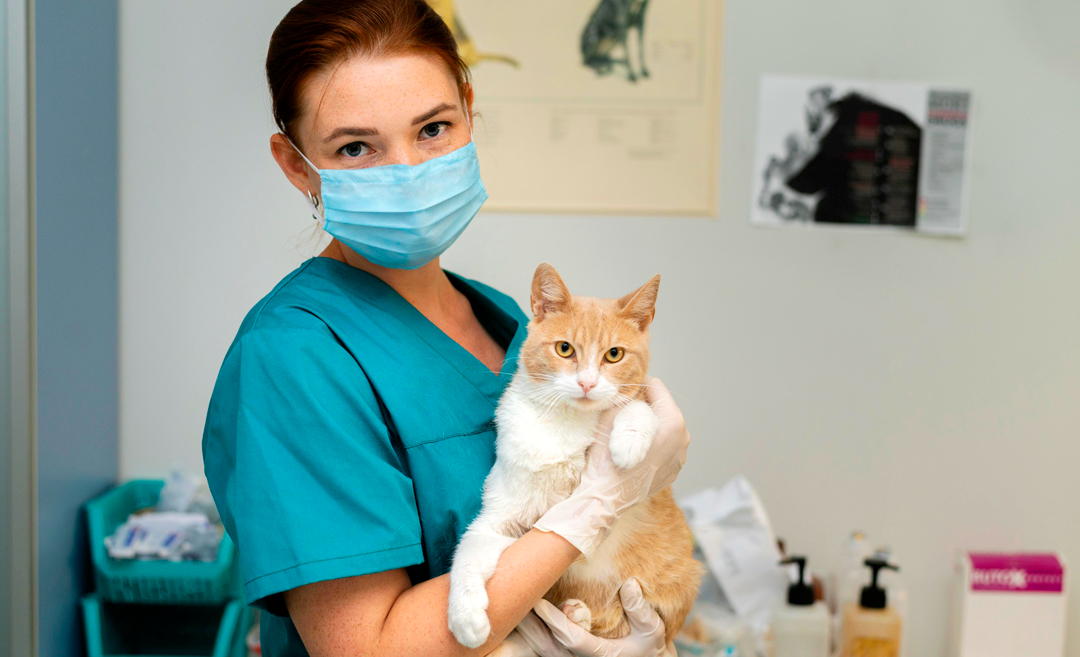Cat neutering is an essential topic for pet owners who want to ensure quality of life and well-being for their felines. Surrounded by myths and taboos, this veterinary practice is, in fact, an act of love and care, providing a longer and healthier life for your pet.
In addition to helping control the feline population and reducing animal abandonment, neutering improves cat behavior and prevents various diseases. To help you understand the subject better, we have created a complete guide on the benefits, the ideal time for neutering, and post-operative care. Keep reading to learn everything about the procedure!
Why Neuter Your Cat?
Neutering is not just about preventing unwanted pregnancies; it also brings significant benefits to feline health and behavior. Some of the main advantages include:
1. Reduction of Undesirable Behaviors
Male cats, in particular, tend to mark territory with strong-smelling urine. Additionally, excessive meowing and escape attempts are common when a cat is in heat or senses a mate nearby. Neutering helps reduce these behaviors, making daily life more peaceful.
2. Prevention of Serious Diseases
The surgery prevents severe diseases such as breast cancer, prostate cancer, uterine infections, and sexually transmitted diseases among cats, such as FIV (Feline Immunodeficiency Virus) and FeLV (Feline Leukemia Virus).
3. Increased Life Expectancy
Neutered cats tend to live longer because they face fewer risks of accidents while trying to escape and are less prone to diseases.
4. Population Control
With the overpopulation of abandoned cats, neutering is an effective solution to reduce the number of homeless animals, preventing uncontrolled reproduction.
When to Neuter Your Cat?
Neutering can be performed at any stage of a cat’s life, but veterinarians recommend it from six months of age. This ensures the animal has healthy development and reduces the risk of surgical complications.
However, always consult a veterinarian to determine the best age for your pet’s neutering, as some professionals suggest surgery as early as two months old.
How Is Cat Neutering Performed?
The surgical procedure is simple and quick, differing for males and females:
- Males (Orchiectomy): Involves removing the testicles from the scrotal sac. The surgery lasts about 15 minutes, and recovery is fast.
- Females (Ovariohysterectomy – OVH): Involves the removal of the uterus and ovaries through a small abdominal incision. Since it is more invasive, the surgery takes a bit longer but remains safe and routine.
In both cases, the cat is anesthetized and monitored throughout the procedure and can return home the same day.
Post-Neutering Care
Your cat’s recovery requires some care to ensure quick and smooth healing:
1. Use of Surgical Clothing or Elizabethan Collar
To prevent the cat from licking or biting the stitches, the use of surgical clothing or an Elizabethan collar is essential until the stitches are removed.
2. Medication and Monitoring
The veterinarian may prescribe painkillers to relieve any discomfort. Follow the recommended dosage strictly.
3. Calm and Comfortable Environment
Prepare a cozy space for your cat to rest, with a soft bed, fresh water, and accessible food. Avoid letting them climb on high furniture or engage in strenuous activities.
4. Healing Monitoring
Check the surgical site daily. If you notice swelling, discharge, excessive redness, or bleeding, take your cat to the veterinarian immediately.
Myths and Truths About Neutering
1. “Neutered cats become obese.” ❌ Myth! Although metabolism may slow down after neutering, obesity results from an improper diet and lack of physical activity.
2. “A cat must have a litter before being neutered.” ❌ Myth! There is no need for a female to have kittens before neutering. Early surgery prevents health problems and unwanted reproduction.
3. “Neutering reduces disease risks.” ✅ Truth! The procedure prevents several serious illnesses, such as uterine infections and tumors.
Neutering is a responsible and loving decision to ensure your cat’s health and well-being. Besides preventing overpopulation, it reduces the risk of diseases and significantly improves feline behavior.
If you still have doubts, talk to a veterinarian to get specific information for your pet. The most important thing is to ensure that your cat has a long, happy life full of love and care! 🐱❤️

